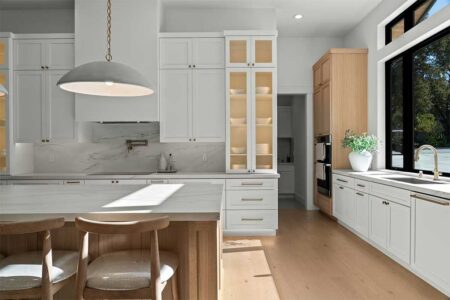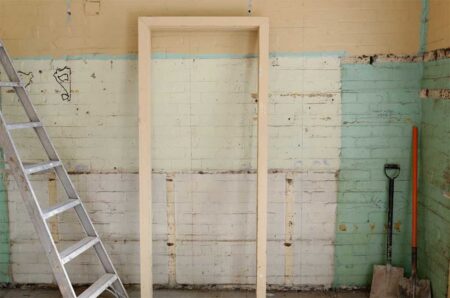Most people would agree that the idea of building a house exactly to your tastes and specifications, from the ground up, and with no expense spared, is a pleasant one. Some even put these plans into action for obvious reasons, even if they only plan to live in the building come retirement.
However, it’s also true that this project is often harder than we recognize at first glance. It’s not just out of laziness that people choose to buy prebuilt homes, but because of how much more cost-effective that proposition is, not to mention the fact the timeline is more flattering when the house is right there to be moved into.
Let’s say you’re aware of all this, and you still want to build your own home from scratch. That’s a noble goal! Sharing your insight when all is said and done, mistakes and all, could be fantastic. Nevertheless, we believe the following five questions to ask could be of great help to you:
Is The Land Development-Friendly & Can You Clear It?
You might have the perfect plot in mind, but that doesn’t always define it as ready to go. Some land just isn’t that cooperative, as maybe it floods easily, or maybe the soil’s all wrong for strong foundations. Sometimes the slope’s wrong, or the soil isn’t up to standard, or the access is too tight for trucks to get in and out without chewing up the ground, and it’s worth figuring that out early before plans start taking shape in your head and you fall in love with something that isn’t really going to work.
Then, of course, there’s the actual clearing of the site, which sounds easier than it is in most cases, because depending on what’s there, you’re probably going to need help from a land clearing company that knows how to manage uncooperative land.
Before anything else gets serious, just make sure the land is properly usable and can be cleared without burning through half your budget or setting everything behind schedule right from the beginning.
Do You Have A Strict Floor Plan?
Note that this isn’t something vague or drawn up in a few minutes during a chat with your architect, but a laid plan that’s been properly thought out based on how you live, how you move through space, what you need day to day, and what might become useful a few years down the line so the house can grow with you.
It’s very tempting to go into this with just a general idea and assume the rest will come together once the build begins, but most of the time, that ends with people changing things on the fly. It’s best to use an architect to truly help you realize your vision so you don’t have to make changes later. Measure twice, cut onc,e as the carpenters say.
Which Unique Features Will Leverage The Strength Of A Custom Build?
The whole reason to build from scratch is so you can have the place you’ve actually been picturing, not something that sort of fits but still feels like someone else lived there first, and that means picking the right details that actually serve the way you live.
Perhaps for you, this entails adding a workshop tucked into the back for a hobby you’ve always wanted to make more room for, or maybe it’s having an open-plan space that allows you to watch your kids more easily. You could just wish for the laundry room to be closer to your other utility spaces.
Make certain you know what your priorities are in such cases. If you’re a car lover and hobbyist mechanic, your own custom build may have a garage space twice the size of another hopeful building on the same plot. It’s okay to lean into your idiosyncrasies – it’s what you’re build for after all.
How Safe Is Your Budget?
Now, you may think you have this under control, right up unti you don’t, and then it all starts adding up in ways that are hard to rein back in, because there are so many hidden costs and little upgrades that suddenly feel necessary without a solid spending plan.
It helps to have a number in mind that you’re absolutely not willing to go over, not the number that feels ideal or comfortable, but the one that says “if we pass this, we’re in dangerous territory”. Make sure to cost this of course, don’t just guess it. You can talk to tradesmen about the projected costs and materials, and negotiate quoted prices.
As time is money, don’t forget to think about how long this is all going to take and how much the delay could cost you elsewhere, because if you’re renting or staying with family or storing all your materials during the build, those extra months start eating away at the leftover funds.
What Are The Clearly Defined Goals And Delegations?
If there’s more than one person involved in the decision-making, like a partner or a family member or a friend helping out, it’s probably a good idea to figure out who’s responsible for what and where the final word is coming from, otherwise you’ll end up with slow decisions, miscommunications, and way too much back and forth over things that should be quick.
Of course, you likely want to have the last say, especially if you’re footing the bill. But of course if the house has custom intentions for other people, like a ground floor wing for your parents to move into, it’s good to include them.
It also helps to have one point of contact when working with the builder or contractor, someone they can check in with after each update. Then it’s important to delegate and decide how far you’re going to get involved . Maybe you’ve worked most of your life as an electrician and are perfectly capable of wiring the new house safely, but you have to be mindful of how long working on your own will take. If you don’t have technical expertise or understanding, don’t try to build parts yourself, no matter how tempting that can be.
With this advice, you’ll be better able to place your home build effort on the right path before it starts.






